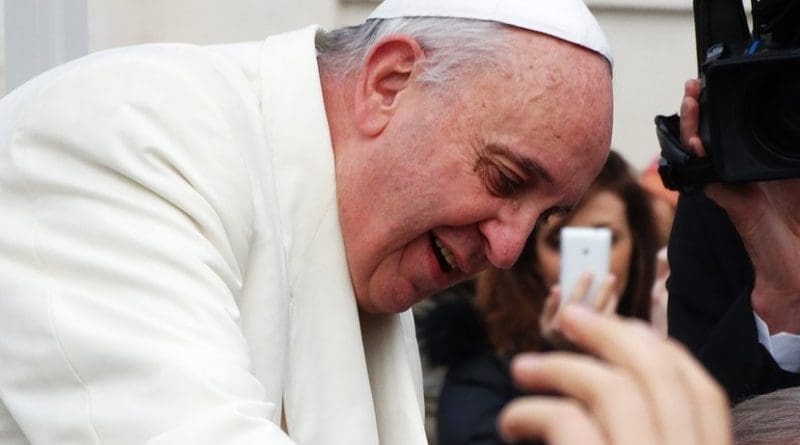Judge Pope Francis On Actions, Not Intentions – OpEd
By UCA News
By Father Myron Pereira*
“Go, Francis — repair my Church!” These words of the crucifix in the church of San Damiano to Francis of Assisi are addressed urgently today to Pope Francis.
No assembly in Rome has had greater significance in recent times than the four-day meeting of the heads of bishops’ conferences that concluded on Feb. 24. The agenda was particularly painful: how to heal the decades of sexual abuse of minors and vulnerable adults perpetrated by the Church’s own clergy and hierarchy.
Seen from this perspective, the sexual abuse crisis points to a massive failure of leadership in the Church.
As Archbishop Mark Coleridge of Brisbane said: “The time for words is past; now is the time for action.” For too long the church hierarchy has been in a state of denial, cover-up, evasiveness and procrastination.
Archbishop Coleridge described the assembly as a “Copernican revolution, no less.” As Copernicus turned our world upside down by demonstrating that the earth was not the center of the universe, so too priests and bishops — yes, and laypeople too! — must realize that they are not the center of the Church, and it’s not their interests which are to be protected.
Rather, it’s time to look at the Church through the eyes of the victims, the abused, those whose lives are broken. And the first step here is to ask for forgiveness. The second is how to reassure the victims they will be rehabilitated and compensated, and that relations between clergy and laity will change irrevocably.
To Pope Francis, it is clear that clericalism, the curse of the clergy and the hierarchy, lies at the root of it all. This is why he has insisted time and time again that the clergy “smell of the sheep” and by his own lifestyle given public witness to simplicity and care for those in need (like the refugees).
For clericalism has different values from those of the gospel. And what are these values?
Firstly, the sense of entitlement. Because I am a priest, a bishop, I deserve special treatment, nay, I demand it. Ordinary Catholics should realize that I am superior to them.
Second, the sin of abuse, not just sexual but also financial. My sense of entitlement authorizes me to take whatever I want — money, women, titles, benefices, whatever. No one can stand in my way.
Thirdly, absence of accountability: I am accountable to no one — not to my superiors, not to the government, certainly not to the laity.
With such a mindset, sexual abuse has been seen not as crime but merely as a sinful act, “a moral failure.” If it is a sin, the act of confession to another priest releases me of guilt. If God forgives me, I am not accountable to my victim.
But if sexual abuse is also a crime, it has social repercussions. It invites prosecution, sanction and punishment. If it is a crime, it must be reported — it can no longer be concealed or wished away. Here is where the clerical culture turns evasive and covers up. How is this done? Through denials, transfers, pay-offs and pre-emptive litigation.
Thus does the clerical culture of the Church foster institutional lying and structural deceit.
Marie Collins, sexually abused as a teenager and now in her 70s, was a member of the Pontifical Commission for the Protection of Minors. She has spearheaded the demand for canonical reform, and demanded important changes. Among them:
- Clearly define what constitutes sexual abuse of a minor. Canon law is vague and imprecise.
- Distinguish clearly between someone who is a minor and someone who is a vulnerable adult. By the latter term, we mean persons with physical, emotional and mental conditions which render them unable to defend themselves when at risk, or to get help. Among such we would include seminarians, religious sisters and most women in parishes.
- Procedures to safeguard minors and vulnerable adults should be set in place, applicable everywhere and publicized. In India, there is the Protection of Children against Sexual Offences Act.
- Clearly spell out what is meant by zero tolerance of the guilty.
- Clearly state how negligent bishops will be brought to justice and held to account.
This last one is important because many bishops in Asia and Africa keep asserting that sexual abuse is a “Western problem, not ours.” To such people as these, Cardinal Oswald Gracias of Mumbai, one of the organizers of the conference, insists that “the Church as a whole must conduct an examination of conscience on how it has handled the issue, because we in leadership roles did not do enough.”
As recent events have shown, India is not exempt from cases of sexual abuse and harassment. And even bishops in Africa are deeply concerned about wider forms of the abuse of minors, as in human trafficking and child soldiers.
We conclude with those poignant words of Marie Collins, indefatigable fighter for the rights of those sexually abused, addressed to bishops and to the pope himself: “You can keep saying how terrible this is. But everybody knows that now. What we want to know is what are you going to do about it. And that’s what we still haven’t got. History will judge Pope Francis on his actions, not on his intentions.”
*Jesuit Father Myron Pereira is a media consultant based in Mumbai.

